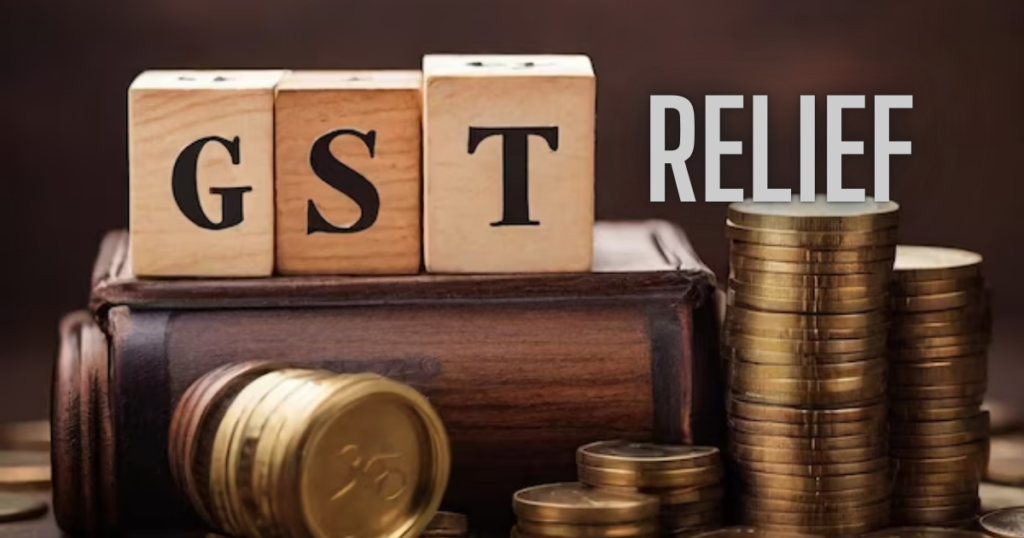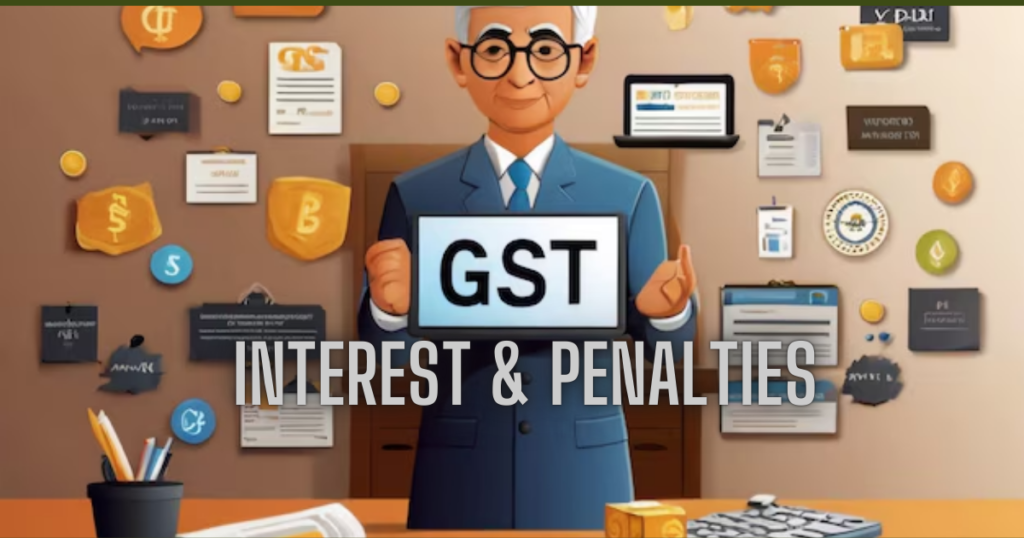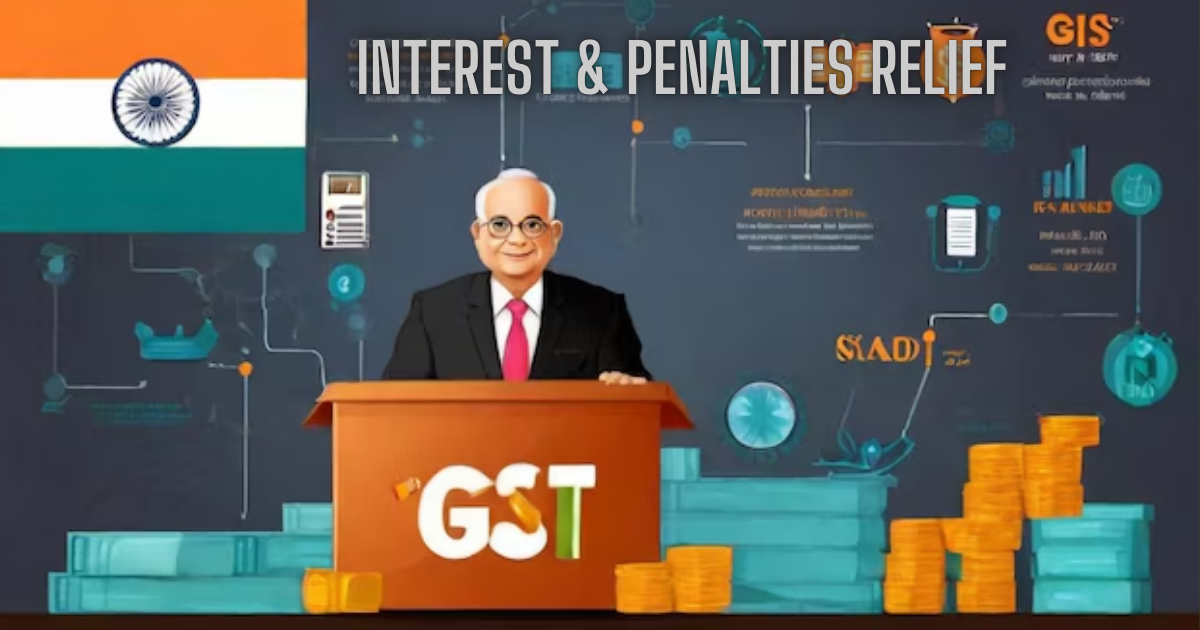GST Relief-No Penalty & Interest-The Ministry of Finance has announced significant relief for GST taxpayers through the introduction of Section 128A of the Goods and Services Tax (GST) Act. Starting from November 1, 2024, individuals and businesses registered under GST can benefit from a conditional waiver scheme that eliminates penalties and interest for certain tax demands. This relief is available for non-fraudulent GST demand notices issued for the financial years 2017-18, 2018-19, and 2019-20. Although taxpayers still need to pay the tax demand amount, this scheme provides much-needed relief by waiving penalties and interest.

What Is the GST Conditional Waiver Scheme?
The newly introduced Section 128A of the GST Act was announced in Budget 2024. It provides a conditional waiver for penalties and interest associated with GST demands, but only for non-fraudulent cases. Taxpayers who are facing demands for the financial years 2017-18, 2018-19, and 2019-20 can now settle their dues without having to worry about additional charges. The waiver only applies if taxpayers agree to pay the tax demand and withdraw any ongoing litigation.
This relief targets taxpayers assessed under Section 73 of the GST Act, which addresses non-fraudulent GST demand notices. This is a big relief for many small and medium businesses, allowing them to settle their disputes without the extra financial burden of penalties and interest.
Who Is Eligible for the GST Waiver Scheme?
According to the Budget 2024, the GST conditional waiver applies to taxpayers who meet specific conditions. The key eligibility criteria include:
- The taxpayer must not be involved in fraudulent activities, willful misrepresentation, or suppression of facts.
- The demand must be raised under Section 73, which pertains to non-fraudulent GST cases.
- The waiver only applies to disputes from the fiscal years 2017-18 to 2019-20.
- Taxpayers who have already paid penalties and interest will not be eligible for a refund under this scheme.
In simpler terms, this waiver is for businesses and individuals who have pending GST disputes, but only if they are non-fraudulent and still unresolved.
Conditions for the Waiver

To take advantage of the GST waiver, taxpayers must agree to certain conditions:
- Payment of Tax Demand: The taxpayer must pay the full amount of the disputed tax.
- Withdrawal of Litigation: Any pending litigation or appeal regarding the tax demand must be withdrawn. Once accepted under the scheme, the case will be closed.
- Deadline for Payment: The tax demand amount must be paid by March 31, 2025 to be eligible for the waiver of penalties and interest.
The table below summarizes the key points:
| Condition | Requirement | Waiver Impact |
|---|---|---|
| Filing GST returns | Agree with the tax demand | Penalties and interest waived |
| Litigation status | Withdraw any pending litigation or appeal | Case closed, no additional charges |
| Payment deadline | Pay tax demand by March 31, 2025 | No penalty, no interest |
How Does the Waiver Work? GST Relief-No Penalty & Interest
The GST conditional waiver scheme is designed to resolve disputes quickly and efficiently. If you have an outstanding GST demand notice that falls under the eligible time periods, here’s how the process works:
- Agree with the Demand: Taxpayers must agree to pay the GST amount that is being disputed.
- Stop Pending Litigation: Any ongoing litigation or appeals must be halted for the scheme to apply.
- Make the Payment: Once the tax demand is paid, penalties and interest are waived, provided that the payment is made by the deadline of March 31, 2025.
Once the conditions are met, the tax notice will be extinguished, and no further penalties or interest will apply. This is a crucial opportunity for businesses with open cases to settle their disputes without the financial burden of additional costs.
Scenarios Covered Under the GST Waiver
According to tax experts, the conditional waiver covers the following scenarios:
- Notice Issued but No Order Passed: The taxpayer has got a demand notice, but the GST officer has not yet passed an order.
- Order Passed but Under Appeal: The order has been passed by the GST officer, but it is still under appeal or review by the Appellate or Revisional Authority.
- Order Under Tribunal Review: The case has reached the Tribunal, but no order has been passed yet.
Who Won’t Benefit From the Waiver?
Not all GST taxpayers will benefit from this waiver. Cases involving fraud, misrepresentation, or suppression of facts will not be eligible. Moreover, if you have already paid the interest and penalties associated with your GST demand, you will not be entitled to a refund under this scheme.
As noted by experts, such as D.K. Sharma, Senior Associate at Virtual CFO Consultancy Services, taxpayers who have already settled their interest and penalty payments will not see any refund or benefit from this waiver. In addition to this, cases involving erroneously sanctioned refunds will not qualify.
Expert Opinions on the GST Waiver
Tax experts have weighed in on the potential impact of this GST waiver. Sharma, a tax consultant, mentioned, “The waiver of interest and penalty is conditional and subject to payment of the disputed tax amount by March 31, 2025.” This highlights the importance of meeting the payment deadline to avail the benefit from the waiver.
Experts agree that this waiver is a positive step for businesses with outstanding GST demands. By eliminating penalties and interest, the government is making it easier for businesses to settle their disputes and move forward.
Impact on Businesses-GST Relief-No Penalty & Interest
The GST waiver scheme offers a substantial relief to businesses struggling with unresolved GST disputes. Small and medium-sized enterprises (SMEs), in particular, can benefit from this scheme as it allows them to settle disputes without the fear of accumulating penalties.
For example, a business with a tax demand for 2018-19 that has been under litigation can now pay the tax amount without having to pay interest or penalties. This reduces the financial burden significantly and helps improve cash flow.
| Financial Year | Tax Demand | Penalty | Interest | Total Amount Due |
|---|---|---|---|---|
| 2018-19 | ₹5,00,000 | ₹50,000 | ₹1,00,000 | ₹6,50,000 |
| Waiver Applied | ₹5,00,000 | ₹0 | ₹0 | ₹5,00,000 |
As seen in the table, a business that would have owed ₹6,50,000 now only needs to pay ₹5,00,000 under the waiver scheme, resulting in significant savings.
Conclusion-GST Relief-No Penalty & Interest
The GST relief through Section 128A offers a golden opportunity for businesses and individuals with non-fraudulent tax disputes. By waiving penalties and interest, the government has provided much-needed breathing space for taxpayers struggling with GST demands from 2017-18 to 2019-20.
Businesses can now settle their dues, improve their cash flow, and avoid further legal entanglements. However, it’s crucial to act quickly, agree with the tax demands, and pay the amount by March 31, 2025 to enjoy the full benefits of this waiver. GST Relief-No Penalty & Interest
Final Thoughts–GST Relief-No Penalty & Interest
This initiative reflects the government’s commitment to simplifying the tax regime and supporting taxpayers. As the deadline approaches, it is crucial for eligible taxpayers to act swiftly and benefit from this scheme.
This article provides a comprehensive overview of the GST conditional waiver scheme, ensuring that readers understand its benefits and how to avail of it. By using simple language and clear headings, the article is designed to be easily readable and informative.
Disclaimer
This article relies on internal data, publicly available information, and other reliable sources. It may also include the authors’ personal views. However, it’s essential to note that the information is for general, educational, and awareness purposes only—it doesn’t disclose every material fact. This analysis is for informational purposes only and does not constitute financial advice. Consult a professional before making investment decisions.
We publish information on World Virtual CFO in good faith, solely for general information. World Virtual CFO doesn’t guarantee the completeness, reliability, or accuracy of this information. These are our views for informational purposes. When you use our website, know that any action you take is entirely at your own risk. World Virtual CFO won’t be liable for any losses or damages connected to your use of our website. For detailed information, refer to our disclaimer page.
Dr. Dinesh Sharma is an award-winning CFO and AI strategist with over two decades of experience in financial leadership, digital transformation, and business optimization. As the founder of multiple niche platforms—including WorldVirtualCFO.com—he empowers professionals and organizations with strategic insights, system structuring, and innovative tools for sustainable growth. His blogs and e-books blend precision with vision, making complex financial and technological concepts accessible and actionable.
